Related Research Articles
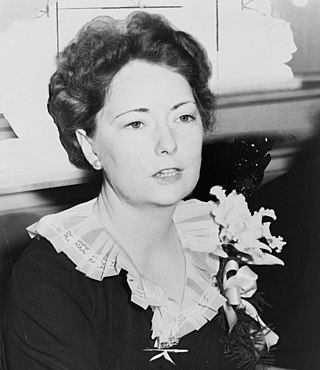
Margaret Munnerlyn Mitchell was an American novelist and journalist. Mitchell wrote only one novel that was published during her lifetime, the American Civil War-era novel Gone with the Wind, for which she won the National Book Award for Fiction for Most Distinguished Novel of 1936 and the Pulitzer Prize for Fiction in 1937. Long after her death, a collection of Mitchell's girlhood writings and a novella she wrote as a teenager, titled Lost Laysen, were published. A collection of newspaper articles written by Mitchell for The Atlanta Journal was republished in book form.

Commerce is a city in Jackson County, Georgia, 70 miles (110 km) northeast of Atlanta. As of the 2020 census, the city had a population of 7,387.

Athens is a consolidated city-county in the U.S. state of Georgia. Downtown Athens lies about 70 miles (110 km) northeast of downtown Atlanta. The University of Georgia, the state's flagship public university and an R1 research institution, is in Athens and contributed to its initial growth. In 1991, after a vote the preceding year, the original City of Athens abandoned its charter to form a unified government with Clarke County, referred to jointly as Athens–Clarke County where it is the county seat.

Rebecca Ann Felton was an American writer, politician, and slave owner who was the first woman to serve in the United States Senate, serving for only one day. She was a prominent member of the Georgia upper class who advocated for prison reform, women's suffrage and education reform. Her husband, William Harrell Felton, served in both the United States House of Representatives and the Georgia House of Representatives, and she helped organize his political campaigns. Historian Numan Bartley wrote that by 1915 Felton "was championing a lengthy feminist program that ranged from prohibition to equal pay for equal work yet never accomplished any feat because she held her role because of her husband."

Alberta Christine Williams King was an American civil rights organizer best known as the wife of Martin Luther King Sr.; and as the mother of Martin Luther King Jr., and also as the grandmother of Martin Luther King III. She was the choir director of the Ebenezer Baptist Church. She was shot and killed in the church by 23-year-old Marcus Wayne Chenault six years after the assassination of her eldest son Martin Luther King Jr.

Leah Ward Sears is an American jurist and former Chief Justice of the Supreme Court of Georgia. Sears was the first African-American female chief justice of a state supreme court in the United States. When she was first appointed as justice in 1992 by Governor Zell Miller, she became the first woman and youngest person to sit on Georgia's Supreme Court.

Lugenia Burns Hope, was a social reformer whose Neighborhood Union and other community service organizations improved the quality of life for African Americans in Atlanta, Georgia, and served as a model for the future Civil Rights Movement.

Rebecca Solnit is an American writer and activist. She has written on a variety of subjects, including feminism, the environment, politics, place, and art. Solnit is the author of seventeen books, including River of Shadows, which won the 2004 National Book Critics Circle Award in Criticism; A Paradise Built in Hell, from 2009, which charts community responses to disaster; The Faraway Nearby, a wide-ranging memoir published in 2013; and Men Explain Things to Me, a collection of essays on feminism and women's writing first published in 2014.

Willie Christine King Farris was an American teacher and civil rights activist. King was the sister of Martin Luther King Jr. She taught at Spelman College and was the author of several books and was a public speaker on various topics, including the King family, multicultural education, and teaching.

Adrienne Elizabeth McNeil Herndon (1869-1910) was an actress, professor, and activist in Atlanta, Georgia. While admittedly an African American to friends and colleagues, she performed with the stage name Anne Du Bignon. She was one of the first African American faculty at Atlanta University, where she was a peer of W. E. B. Du Bois. She was married to prominent businessman Alonzo Herndon.
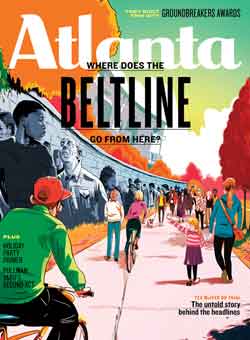
Atlanta is a monthly general-interest magazine based in Atlanta, Georgia, and owned by Hour Media Group, LLC. Its staff has featured notable writers such as Hollis Gillespie, Anne Rivers Siddons, and William Diehl, and it has included contributions from Pat Conroy, Rebecca Burns, Terry Kay, and Melissa Fay Greene. It is a member of the City and Regional Magazine Association (CRMA). Atlanta also publishes the travel magazine Southbound.
Gena Knox is an American food writer, cookbook author, and entrepreneur. Her first cookbook, Gourmet Made Simple, was released in May 2008. She is also the founder and CEO of Fire & Flavor, a company specializing in grilling planks and at-home cooking products. Knox's third book, Southern My Way: Food & Family, was released in 2013.
Prathia Laura Ann Hall Wynn was an American leader and activist in the Civil Rights Movement, a womanist theologian, and ethicist. She was the key inspiration for Martin Luther King Jr.'s "I Have a Dream" speech.
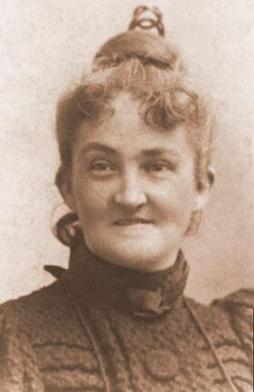
Mildred Lewis Rutherford was a prominent white supremacist speaker, educator, and author from Athens, Georgia. She served the Lucy Cobb Institute, as its head and in other capacities, for over forty years, and oversaw the addition of the Seney-Stovall Chapel to the school. Heavily involved in many organizations, she became the historian general of the United Daughters of the Confederacy (UDC), and a speech given for the UDC was the first by a woman to be recorded in the Congressional Record. She was a prolific writer in historical subjects and an advocate of the Lost Cause narrative. Rutherford was distinctive in dressing as a southern belle for her speeches. She held strong pro-Confederacy, proslavery views and opposed women's suffrage.

The Henry Grady Hotel was a hotel in downtown Atlanta, Georgia, United States. The building, designed by architect G. Lloyd Preacher, was completed in 1924 at the intersection of Peachtree Street and Cain Street, on land owned by the government of Georgia that had previously been occupied by the official residence of the governor. The hotel, which was named after journalist Henry W. Grady, was owned by the state and leased to operators. During the mid-1900s, the hotel typically served as the residence of state legislators during the legislative sessions, and it was an important location for politicking, with President Jimmy Carter later saying, "[m]ore of the state's business was probably conducted in the Henry Grady than in the state capitol". In the late 1960s, the government decided to not renew the building's lease when it expired in 1972, and it was demolished that year. The land was sold to developers and the Peachtree Plaza Hotel was built on the site. At the time of its completion in 1976, it was the tallest hotel building in the world.
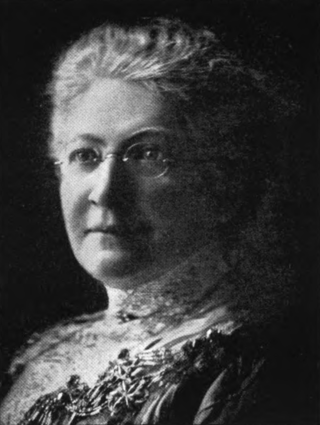
Mary Ellen Peters Black (1851–1919) was a prominent organizer and activist related to women's issues in Georgia. Black also promoted agricultural reform and increasing educational opportunities, especially for women. She was an active member of the Atlanta Woman's Club as well as the Woman's Auxiliary of the Episcopal Diocese of Georgia.

Gayle Barron is a former American marathon runner. From 1970 to 1978, Barron placed in the top five in marathons held across the United States and was the winner of the 1978 Boston Marathon. Barron was inducted into the Georgia Sports Hall of Fame in 2003 and the Atlanta Sports Hall of Fame in 2007.
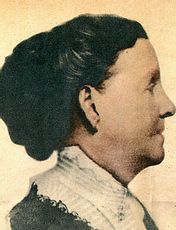
Sarah Harper Heard was an American educator, activist, librarian, and gardener. Well-educated and interested in many topics, Heard was described by an acquaintance as "one of those magnificent Victorian women who had a super-charged energy, which home life could never use up".
The Atlanta sit-ins were a series of sit-ins that took place in Atlanta, Georgia, United States. Occurring during the sit-in movement of the larger civil rights movement, the sit-ins were organized by the Committee on Appeal for Human Rights, which consisted of students from the Atlanta University Center. The sit-ins were inspired by the Greensboro sit-ins, which had started a month earlier in Greensboro, North Carolina with the goal of desegregating the lunch counters in the city. The Atlanta protests lasted for almost a year before an agreement was made to desegregate the lunch counters in the city.
The Ministers' Manifesto refers to a series of manifestos written and endorsed by religious leaders in Atlanta, Georgia, United States, during the 1950s. The first manifesto was published in 1957 and was followed by another the following year. The manifestos were published during the civil rights movement amidst a national process of school integration that had begun several years earlier. Many white conservative politicians in the Southern United States embraced a policy of massive resistance to maintain school segregation. However, the 80 clergy members that signed the manifesto, which was published in Atlanta's newspapers on November 3, 1957, offered several key tenets that they said should guide any debate on school integration, including a commitment to keeping public schools open, communication between both white and African American leaders, and obedience to the law. In October 1958, following the Hebrew Benevolent Congregation Temple bombing in Atlanta, 311 clergy members signed another manifesto that reiterated the points made in the previous manifesto and called on the governor of Georgia to create a citizens' commission to help with the eventual school integration process in Atlanta. In August 1961, the city initiated the integration of its public schools.
References
- ↑ Rebecca Burns Decatur Book Festival
- 1 2 3 Rebecca Burns Atlanta Magazine
- ↑ Bio Rebecca Burns website